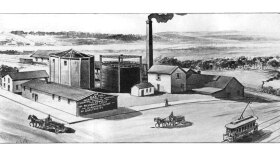(Editor's note: This story was originally published in July 2009)
Neal Fisher thinks he’s an environmentally friendly kind of guy. He and his wife recycle, they use compact fluorescent light bulbs in the house, they walk most places and hardly ever use their car.
But when it comes to outdoor grilling... it’s charcoal all the way.
“It may be a little decadent when you’re taking the environment into consideration, but I do it.”
On tonight’s menu, it’s burgers, Jamaican jerk chicken, onions, and asparagus. Everything is grilled on basic, 22 ½ inch Weber kettle.
“Nothing fancy, no frills,” says Fisher.
To get the fire started, Fisher throws about 7 or 8 pounds of hardwood lump charcoal into a chimney starter.
“I don’t use the lighter fluid, I just use the charcoal chimney. I figure if I’m going to be cooking wood, I don’t want to cook a lot of chemicals too. So that’s something. I don’t kid myself that this is at all healthy for the world," says Fisher. "
%22I%20sometimes%20joke%20about%20it%2C%20too%2C%20well%20there%20goes%20my%20carbon%20footprint.%20Suddenly%20I%27m%20carbon%20Sasquatch.%22
To find out if Fisher really is a carbon Sasquatch, I called up Eric Johnson in Switzerland.
“Basically the footprint of using charcoal is about 3 times higher than the footprint of gas,” says Johnson.
Johnson published a study in the journal Environmental Impact Assessment Review. In it, he compared the carbon dioxide emissions – or carbon footprint – of the two most popular types of grills: charcoal and propane gas.
When it comes to straight up carbon emissions – gas grills win hands down. Run your gas grill for an hour; emit 5.6 pounds of carbon dioxide into the air. Use charcoal briquettes for an hour of grilling; emit a whopping 11 pounds of CO2.
Fair enough.
But what if we look at the total carbon cycle of propane gas, a fossil fuel and charcoal, which is a bio fuel?
For that answer, we’ll turn to Bill Currie. He’s a professor in the School of Natural Resources at the University of Michigan.
“You have to think about, can we replace the carbon back in the pool that charcoal came from? Can we replace it biologically over a reasonable period of time? And with charcoal, the answer is yes, we can re-grow those trees," says Currie.
That’s because charcoal is made out of wood, which is a renewable energy source. So if charcoal is harvested locally in a sustainable way, the re-grown trees can absorb the CO2 - which makes charcoal essentially carbon neutral. So charcoal made out of wood which is renewable. Propane gas on the other hand is made from oil. Not renewable.
“Fuels that are based on coal, oil, petroleum based fuel, it’s not possible to put that CO2 back where it was biologically in a reasonable amount of time. And that’s the big difference,” says Currie.
But does any of this really matter? I mean, how important is grilling in the overall environmental scheme of things. Well Currie says it’s definitely not a big-ticket item like, say, the size of your house or the number of cars you have.
“It’s probably a small factor in the whole analysis. But at the same time, we make dozens or hundreds of these choices a day. And if we know that one alternative is better than another, these little things do matter because they add up,” says Currie.




